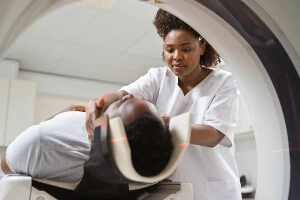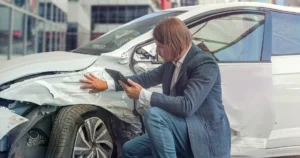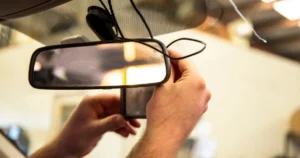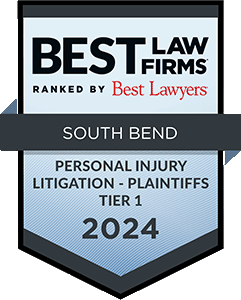When internal bleeding occurs after a car crash, victims may not immediately recognize the severity of their injuries. Hidden internal injuries can lead to life-threatening complications, expensive medical bills and extensive recovery time that impacts your ability to work and enjoy life.
Table of Contents
- How Does Internal Bleeding Happen After a Car Accident?
- What Are Warning Signs of Internal Bleeding After a Car Accident?
- Common Internal Injuries From Car Crashes
- Why Do Doctors Sometimes Miss Internal Bleeding in the Emergency Room After a Crash?
- How Does a Delaying Medical Care Affect Your Indiana Injury Claim?
- What Evidence Links Your Internal Injuries Directly to the Car Accident?
- Damages You Can Recover for Internal Bleeding Injuries
- How Can I Recover Compensation for My Internal Car Crash Injuries
- When Do Internal Injuries From a Car Crash Qualify for Catastrophic Injury Compensation?
- Injured in a Car Accident? Call Our Trusted Law Firm Today
At Pfeifer Morgan & Stesiak, our experienced South Bend car accident attorneys have successfully represented victims suffering from internal bleeding injuries, securing the compensation they deserve. While you focus on healing, our legal team will handle every aspect of your case, ensuring insurance companies and liable parties are held responsible for your suffered damages.
Request a FREE case review today. Call: (574) 444-0741
How Does Internal Bleeding Happen After a Car Accident?
 Internal bleeding from a car accident occurs when the impact of a collision causes damage to organs and blood vessels inside your body. These injuries are a danger to your health, because it means blood is leaking into your body.
Internal bleeding from a car accident occurs when the impact of a collision causes damage to organs and blood vessels inside your body. These injuries are a danger to your health, because it means blood is leaking into your body.
Unlike visible external injuries, internal bleeding happens beneath the skin, so it is not easily detected.
Is Internal Bleeding a Serious Threat to My Health?
Yes, because even though these injuries cannot be seen, they can cause life-threatening harm if not promptly diagnosed and treated.
The severity of internal injuries ranges from minor bruising and fractures to ruptured organs and hemorrhages that can lead to organ failure, shock or death if not promptly diagnosed and treated. The potential for suffering serious internal injuries in a car crash emphasizes why it is vital to seek medical care after a car accident without delay.
What Are Warning Signs of Internal Bleeding After a Car Accident?
Internal bleeding after a car accident can present subtle but dangerous symptoms that might develop hours or even days after the collision. Car crash victims should always seek prompt medical attention but recognizing these warning signs can be lifesaving:
- Abdominal pain, swelling or bruising, especially if it increases over time
- Dizziness, lightheadedness or fainting when trying to stand
- Rapid heart rate or difficulty breathing without exertion
- Severe headache or loss of consciousness following head trauma
- Visible bruising across the abdomen where the seatbelt made contact
- Cold, clammy skin that appears pale or grayish in color
- New or worsening confusion and disorientation
- Blood in urine, stool or vomit
- Unexplained weakness or numbness, particularly on one side of the body
- Persistent low blood pressure readings if monitoring at home
Common Internal Injuries From Car Crashes
Car crashes can cause severe trauma to organs and tissues, often with symptoms that develop hours or days after the accident. These injuries are common among those with internal bleeding
- Traumatic brain injuries (concussions, hemorrhages)
- Internal bleeding (hematomas)
- Ruptured spleen
- Liver lacerations
- Kidney damage
- Pneumothorax (collapsed lung)
- Broken ribs
- Aortic tears
- Bowel or intestinal perforations
- Pancreatic trauma
Why Do Doctors Sometimes Miss Internal Bleeding in the Emergency Room After a Crash?
Emergency room doctors may miss internal bleeding after a crash due to several factors. The early symptoms of an internal injury may often present with non-specific signs that could apply to many injuries. Mild discomfort or a slightly elevated heart rate, for example, can be a sign of the normal stress response to trauma. Time constraints are another factor in busy emergency departments handling multiple critical patients. Doctors may rush through examinations or follow-up assessments, causing them to miss key signs of internal injuries.
Where You Seek Medical Care After a Crash Matters
If you seek medical care from your primary care doctor or even an urgent care center first, you may be wasting precious time. These facilities often do have immediate access to diagnostic equipment, which is needed to assess you for internal bleeding, organ damage or other internal injuries. This is why going to the emergency room after a crash is often the best choice for treatment. These facilities are always open and fully equipped with diagnostic equipment.
What You Tell Your Doctor About the Accident and Your Injuries Is Vital
Crash victims play a role in helping doctors understand where you might be injured. Telling doctors you were involved in a serious crash, for example, is a key sign that you may have serious internal injuries. Crash victims may sometimes downplay their injuries, especially when they do not see any visible damage. Relaying every symptom after a crash, even if you do not think they are related, can help your doctor get the diagnostic tests and treatment you need more quickly. Time is often critical with severe internal injuries.
How Does Delaying Medical Care After a Car Crash Affect Your Indiana Injury Claim?
Delaying medical care after an accident can severely weaken your Indiana injury claim by giving insurance companies ammunition to dispute the severity and cause of your injuries. When you delay seeking treatment for internal bleeding, insurers gain significant advantages in the claims process.
- Creates a documented “gap in care” that insurers use to dispute accident causation
- Enables insurers to question the severity of your internal injuries
- Weakens the medical evidence connecting your injuries to the accident
- Provides legal basis for significantly reduced settlement offers
- Allows defense to attribute your injuries to pre-existing medical conditions
- Compromises the quality and completeness of medical documentation
- Diminishes your negotiating position by introducing doubt about your claim
- Risks denial based on policy requirements for timely medical attention
Medical Evidence That Links Your Internal Injuries Directly to the Car Accident?
Medical documentation creates a timeline that connects your internal injuries directly to the accident. This is why seeking medical care right after a crash is critical – both to your health and to protect your legal claim. Other evidence may include diagnostic imaging and specialist evaluations that reveal trauma patterns consistent with the crash’s impact. Your medical records serve as key evidence that links your injuries to the crash that caused them.
- Emergency Room Records: These documents provide evidence of your condition immediately after the collision.
- Medical Imaging: Scans show specific trauma patterns that are consistent with accident forces.
- Physician Testimony: This expert evidence explains how crash dynamics directly caused your internal injuries.
- Blood Test Results: Laboratory findings show elevated markers of organ damage or internal bleeding.
- Timeline of Symptom Progression: Documentation correlates your symptoms with typical post-accident injury development.
- Lack of Pre-existing Conditions: Medical history demonstrates you had no prior issues involving similar internal injuries.
- Accident Reconstruction Expert Testimony: This specialized evidence connects impact forces to your specific injuries.
Damages You May Be Eligible to Recover for Internal Bleeding Injuries
Internal injuries from car accidents often result in substantial medical costs and a lengthy recovery. Victims may be entitled to compensation for:
- Emergency treatment and hospitalization costs
- Surgical procedures and long-term rehabilitation expenses
- Lost wages and reduced earning capacity
- Pain, suffering and emotional distress
- Permanent disability or disfigurement
- In-home care and medical equipment needs
How Can I Recover Compensation for My Internal Car Crash Injuries
Recovering compensation for internal injuries after a car crash typically requires filing an insurance claim against the at-fault driver. You will need to document your injuries through medical records and evidence from the accident scene. Demonstrating how these injuries have impacted your life financially and personally through personal experiences or a personal injury journal.
Under Indiana’s comparative negligence, working with a Pfeifer, Morgan & Stesiak personal injury attorney can significantly improve your chances of receiving fair compensation. They can value your claim appropriately, including current and future medical expenses, lost wages, pain and suffering and diminished quality of life. Your attorney will handle negotiations with insurance companies and, if needed, represent your case in court to ensure you receive the full compensation you deserve for your internal injuries.
When Do Internal Injuries From a Car Crash Qualify for Catastrophic Injury Compensation?
If your internal injuries are the result of a car crash, they may qualify for catastrophic injury compensation. To be eligible, your injuries must result in permanent, life-altering consequences that significantly impact your ability to function or work. Severe damage to vital organs such as the liver or spleen, may qualify. You may also qualify for catastrophic injury compensation if your injuries lead to long-term disability, ongoing medical treatment or substantial lifestyle modifications.
A “catastrophic” injury requires medical evidence demonstrating how your internal injuries have resulted in permanent impairment, require lifelong care or have dramatically reduced your life expectancy or quality of life. Insurance companies and courts consider many factors, including:
- Multiple surgeries are needed
- Extended hospitalization in intensive care units
- Permanent medical devices
- The inability to return to your previous employment
- Loss of your ability to live independently
Your attorney will establish that these severe consequences stem directly from the accident. He or she will also quantify how these injuries have resulted in a lifetime of medical expenses, lost earning capacity, and profound pain and suffering.
Injured in a Car Accident? Call Our Trusted Law Firm Today
Internal bleeding injuries need immediate medical attention. Once these injuries have been stabilized, your case will benefit from having skilled legal representation to secure the compensation you deserve.
At Pfeifer Morgan & Stesiak, our dedicated attorneys understand the complex medical and legal challenges of car crash cases, including those resulting in internal injuries. We have a proven track record of securing favorable results for our clients throughout South Bend and surrounding areas. When we represent you, we will fight to secure the compensation you deserve while you focus on healing.
Worried about costs? We offer a free consultation and there are no upfront costs or fees when we fight for your justice. We do not get paid unless you do.
Experienced Lawyers. Proven Results. Call: (574) 444-0741 today











